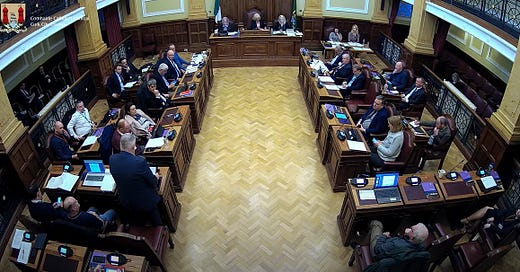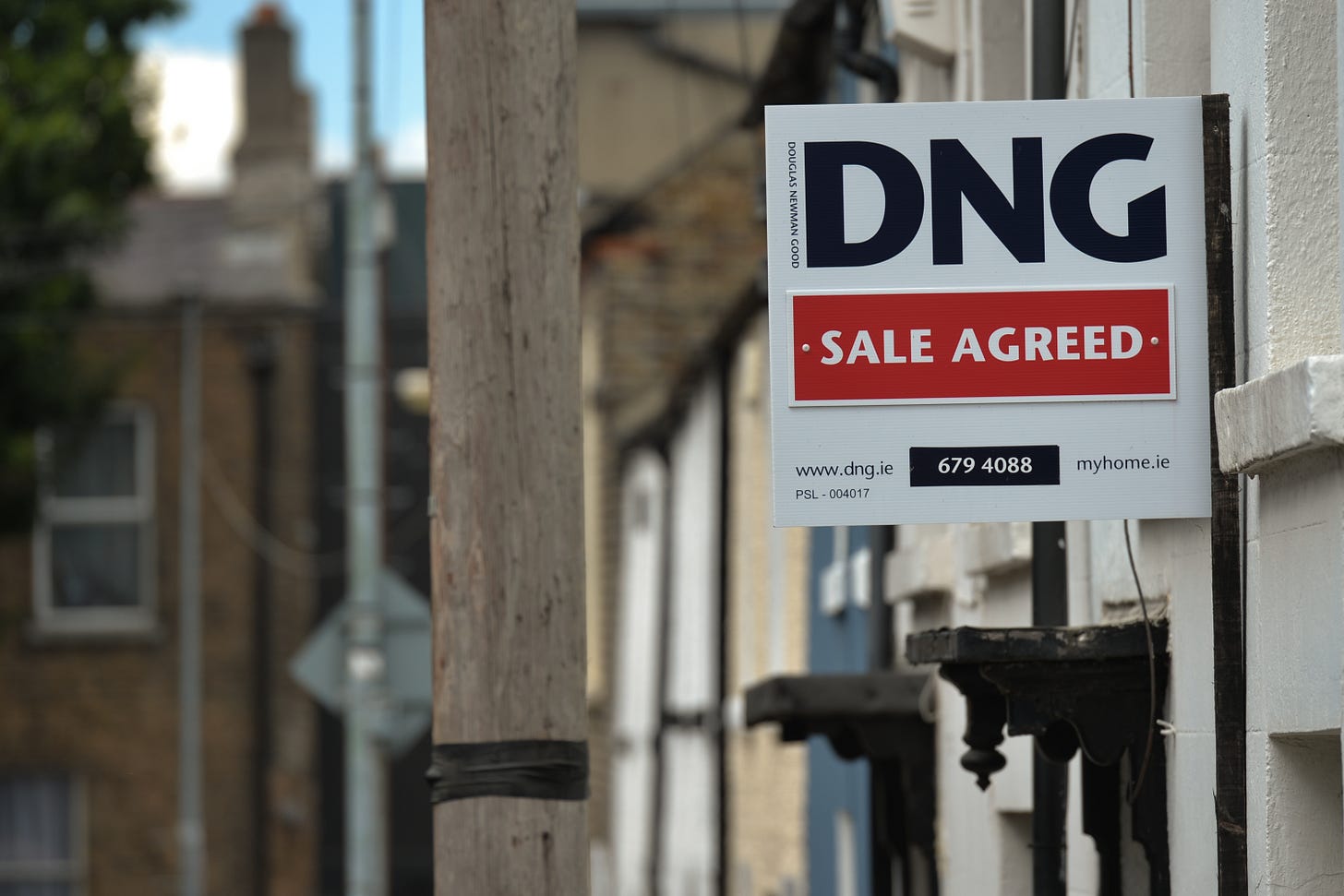Lengthy and testy Cork City Council meeting on housing crisis comes up short on solutions
The housing emergency and the lifting of the eviction ban dominated a council meeting that often veered into political point-scoring.
An ordinary meeting of Cork City Council was once again dominated by the city’s housing crisis which has been made more acute by the lifting of the eviction ban.
However, before councillors could get down to the meat and bones of debating amendments and voting on motions at last night's meeting, over 50 minutes were spent debating the controversial ending of a special meeting from the previous week. That special meeting was all over in less than half an hour.
The meeting, on April 3, was called to discuss the council’s preparedness for the ending of the eviction ban.
At the heart of the first part of Monday evening’s debate was how council meetings should proceed, and why the meeting from last week never got off the ground.
In his opening remarks, cllr Tony Fitzgerald (FF), chair of the housing Strategic Policy Committee (SPC), called on his fellow councillors to conduct their business with decorum.
“It makes sense as professionals regardless of your party to do our business correctly,” he said.
In testy and shouty scenes, councillors weighed in on their views of the special meeting which ended acrimoniously.
“I absolutely refute that I suspended any meeting. I take grave exception,” Lord Mayor Deirdre Forde said in her response to why she ended the meeting against the protests of Sinn Fein and other councillors.
The Lord Mayor added that councillors have had numerous meetings about the housing crisis.
“I was stunned on the night that the meeting abruptly ended,” Cllr Mick Nugent (SF) said in council chambers in Cork City Hall.
Cllr Thomas Moloney, (Independent), said that the purpose of the special meeting was to further discuss the most important political and social issue of the day, how the City Council is prepared to deal with the ending of the eviction ban.
In their comments, both Lorna Bogue (An Rabharta Glas-Green Left) and Cllr Moloney asked if a special meeting would not be a better venue than an SPC for a full-throttle, out-in-the-open discussion about ending the eviction ban and how the City Council is prepared to deal with it.
However, councillors from both Fianna Fáil and Fine Gael said there had been numerous meetings and the special meeting was not the place.
Des Cahill (FG), said that five members of the council acted out of procedure, referring to the Sinn Féin block.
It was not lost on councillors that they spent nearly an hour debating a council meeting in which no debating took place.
A protest organised by Cork Cost of Living Campaign took place outside City Hall prior to Tuesday night’s meeting. Protestors are calling for the reinstatement of the eviction ban, a call that was echoed by councillors on the political left.
Building stock
In a section of the meeting dedicated to a report from a SPC meeting on housing held in March, Cllr Fitzgerald outlined the local authority and the government’s house building targets.
From 2022 to 2026, the City Council plans to build 3,934 social houses, 729 are already built he said.
The city council’s housing directorate built 2,839 social houses over the five year period from 2017 to 2022. Currently, 1,151 social houses are under construction across 32 sites in the city. Furthermore, 412 voids are due to be made available in the city in 2023.
Notice to quit
However, the figures that many councillors zeroed in on were the rising numbers of notices to quit, or eviction notices that have been served, since the eviction ban was lifted by the coalition government at the end of March.
Of the 50,499 tenancies in the city registered with the Residential Tenancies Board (RTB), 0.9%, or 144 tenancies, have been issued with a valid notice to quit.
The total verified number of notices of termination in Cork City and county totals 336 tenancies. Of the 2,956 Housing Assistance Payment (HAP) and Rental Accommodation Scheme (RAS) in Cork City, 64 were issued with valid terminations.
Councillors weighed in at length on the lifting of the eviction ban, mostly reflecting party lines around the vote and the government’s response to it.
While there was broad support for the Council’s response and efforts to react to the lifting of the eviction ban, several councillors chose to politicize the crisis in point-scoring.
Des Cahill (FG) said it was worth recalling that the city council built nearly 3,000 social housing units between 2017 and 2022. However, this comes as the population of the city is also increasing year on year.
Cllr Mick Nugent (SF) asked the council executive if they were ready to roll out the “cost rental backstop”, a new scheme designed to to help tenants at risk of homelessness as they don't qualify for social housing supports, but would allow them to continue to rent their homes.
Cllr Nugent also asked the housing director if the council had the staff to implement such strategies.
Cllr Moran (Greens) in his contribution to the debate focused more on policy and strategy and asked the housing directorate of the City Council if they are in the position to buy property from landlords who want to quit the market.
He also pointed out that statistics from the RTB show evictions to sell a property account for 60% of all notices to quit with just 16% of evictions are for breaches of tenant obligations.
Cllr Moran asked that the council update a dedicated page on the council’s website to include as much information as possible to tenants who have been issued with a notice of termination and to aggressively pursue resources available from central government to tackle the housing emergency.
Cllr Moran said that “removing sale as a reason to end a tenancy” is an important next step in ensuring the rights of renters. He also highligted that we still don’t have a timeline for the housing referendum. Cllr Collette Finn (Greens) also raised the right to housing, which would form a central plank in a housing referendum.
Cllr Sean Martin (FF) said it was important that landlords in Ireland, who “are generally people like the butcher or the publican” are not vilified with the lifting of the eviction ban and the substantial uptick in evictions. His point was echoed by Cllr Kieran McCarthy (Ind.) who said that it’s vital that ‘small’ landlords are not chased out of the market.
Cllr McCarthy spoke about how the lifting of the eviction ban had a personal aspect; his sister was recently served with an eviction notice.
Cllr Eolan Ryng (SF) noted that according to RTB figures, there will be 975 notices to quit issued by landlords in Cork in the final six months of the year, on top of the more than 100 notices that have already been issued.
He said they are households and families going to bed with anxiety “tonight, tomorrow and every other week.”
Cllr Terry Shannon (FF) said there is too much interference in the private rental market which he said is driving landlords out, echoing his party colleagues that the market needs a diverse mix of supply.
He called Sinn Féin a “national disgrace” and asked the chair for “protection” amid loud protests from Sinn Fein councillors.
Shane O’Callaghan (FG) asked the Sinn Féin councillors if they would extend the eviction ban for up to 10 years.
Garret Kelleher (FG) told the chamber that a starting point in conversations he has with constituents who come to him with housing needs is to outline to them that the current waiting time on the city’s housing list is more than seven years. He said the priority of the council and councillors should be to drive down that waiting time.
His fellow party councilllor, Damian Boylan, spoke about the urgency of the situation and called on councillors to cast aside their differences to work together.
“Can we get into a room and workshop ideas instead of political point scoring?” asked Cllr Boylan. “Bring your flask and sandwiches”, he added.
At 9:20pm, nearly four hours after the meeting started, Lord Mayor Dierdre Forde, called a halt to the debate on housing as it had disintegrated “into a slagging match” . However, the debate soon again started up and dominated proceedings in a meeting that stretched past 10pm.
When he returned to answer some questions nearly four hours after the start of the meeting, Niall Ó Donnabháin, Director of Housing, said "no one in the executive is disputing the RTB figures" and referred to the proceedings in the council as a "robust debate.
Ó Donnabháin said if councillors outline progressive approaches that the executive can take to improve housing supply they will be examined. There were, however, very little in the way of solutions outlined on the night.






